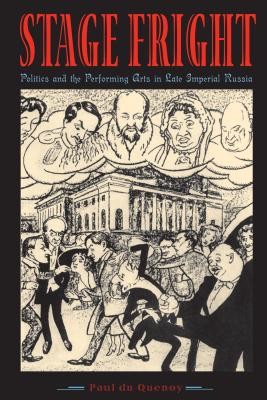
- We will send in 10–14 business days.
- Author: Paul Du Quenoy
- Publisher: Penn State University Press
- ISBN-10: 0271058781
- ISBN-13: 9780271058788
- Format: 15.2 x 22.9 x 1.8 cm, minkšti viršeliai
- Language: English
- SAVE -10% with code: EXTRA
Reviews
Description
In June 1920, assessing the international significance of the revolutionary era that had brought him to power in Russia, Vladimir Lenin adopted a theatrical idiom for one of its most important events, the Revolution of 1905. "Without the 'dress rehearsal' of 1905," he wrote, "the victory of the October Revolution in 1917 would have been impossible." According to Lenin's statement, political anatomy borrowed in a teleological sense from the performing arts.
This book explores an inversion of Lenin's statement. Rather than question how politics took after the performing arts, Paul du Quenoy assesses how culture responded to power in late imperial Russia. Exploring the impact of this period's rapid transformation and endemic turmoil on the performing arts, he examines opera, ballet, concerts, and "serious" drama while not overlooking newer artistic forms thriving at the time, such as "popular" theater, operetta, cabaret, satirical revues, pleasure garden entertainments, and film. He also analyzes how participants in the Russian Empire's cultural life articulated social and political views.
Du Quenoy proposes that performing arts culture in late imperial Russia--traditionally assumed to be heavily affected by and responsive to contemporary politics--was often apathetic and even hostile to involvement in political struggles. Stage Fright offers a similar refutation of the view that the late imperial Russian government was a cultural censor prefiguring Soviet control of the arts. Through a clear picture of the relationship between culture and power, this study presents late imperial Russia as a modernizing polity with a vigorous civil society capable of weathering the profound changes of the twentieth century rather than lurching toward an "inevitable" disaster of revolution and civil war.
EXTRA 10 % discount with code: EXTRA
The promotion ends in 21d.14:21:42
The discount code is valid when purchasing from 10 €. Discounts do not stack.
- Author: Paul Du Quenoy
- Publisher: Penn State University Press
- ISBN-10: 0271058781
- ISBN-13: 9780271058788
- Format: 15.2 x 22.9 x 1.8 cm, minkšti viršeliai
- Language: English English
In June 1920, assessing the international significance of the revolutionary era that had brought him to power in Russia, Vladimir Lenin adopted a theatrical idiom for one of its most important events, the Revolution of 1905. "Without the 'dress rehearsal' of 1905," he wrote, "the victory of the October Revolution in 1917 would have been impossible." According to Lenin's statement, political anatomy borrowed in a teleological sense from the performing arts.
This book explores an inversion of Lenin's statement. Rather than question how politics took after the performing arts, Paul du Quenoy assesses how culture responded to power in late imperial Russia. Exploring the impact of this period's rapid transformation and endemic turmoil on the performing arts, he examines opera, ballet, concerts, and "serious" drama while not overlooking newer artistic forms thriving at the time, such as "popular" theater, operetta, cabaret, satirical revues, pleasure garden entertainments, and film. He also analyzes how participants in the Russian Empire's cultural life articulated social and political views.
Du Quenoy proposes that performing arts culture in late imperial Russia--traditionally assumed to be heavily affected by and responsive to contemporary politics--was often apathetic and even hostile to involvement in political struggles. Stage Fright offers a similar refutation of the view that the late imperial Russian government was a cultural censor prefiguring Soviet control of the arts. Through a clear picture of the relationship between culture and power, this study presents late imperial Russia as a modernizing polity with a vigorous civil society capable of weathering the profound changes of the twentieth century rather than lurching toward an "inevitable" disaster of revolution and civil war.


Reviews